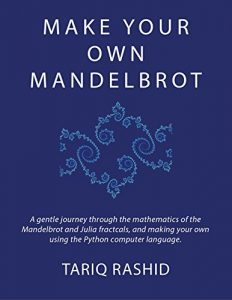A step-by-step gentle journey through the mathematics of the Mandelbrot and Julia fractals, and making your own using the Python computer language.
Mathematics can be fun, exciting, surprising, and stunningly beautiful. But too few people ever experience this, associating it instead with boring and apparently pointless exercises in trigonometry and solving equations.
This guide will take you on an emotional journey, starting from very simple ideas, and exploring some surprising and intricately beautiful behaviors of the very simple mathematics that underlies the famous Mandelbrot fractal. You won't need anything more than basic school mathematics.
Part 1 is about ideas. It introduces the mathematical ideas underlying the Mandelbrot fractal, gently with lots of illustrations and examples.
Part 2 is practical. It introduces the popular and easy to learn Python programming language, and gradually builds up a program to calculate and visualise the Mandelbrot fractal.
Part 3 extends these ideas. It reveals the related Julia fractals, creates 3-dimensional landscapes and shows how even more interesting images can be made using mathematical filters.
The fractal image on the cover of this book is created using only the ideas and code developed in this book.
Mathematics can be fun, exciting, surprising, and stunningly beautiful. But too few people ever experience this, associating it instead with boring and apparently pointless exercises in trigonometry and solving equations.
This guide will take you on an emotional journey, starting from very simple ideas, and exploring some surprising and intricately beautiful behaviors of the very simple mathematics that underlies the famous Mandelbrot fractal. You won't need anything more than basic school mathematics.
Part 1 is about ideas. It introduces the mathematical ideas underlying the Mandelbrot fractal, gently with lots of illustrations and examples.
Part 2 is practical. It introduces the popular and easy to learn Python programming language, and gradually builds up a program to calculate and visualise the Mandelbrot fractal.
Part 3 extends these ideas. It reveals the related Julia fractals, creates 3-dimensional landscapes and shows how even more interesting images can be made using mathematical filters.
The fractal image on the cover of this book is created using only the ideas and code developed in this book.






